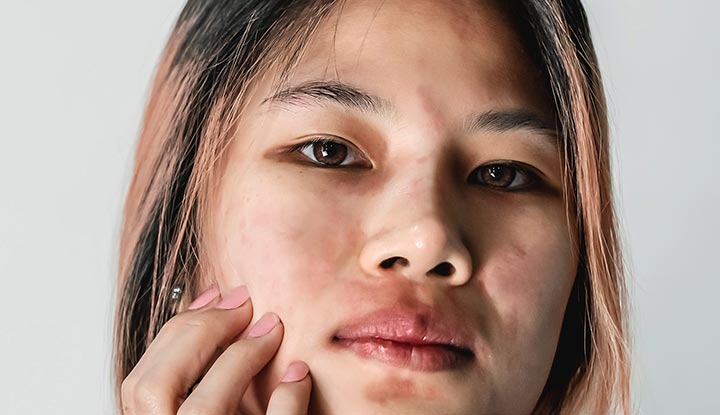Eczema on the lips is a skin irritation that can make your lips red, itchy, cracked and painful. The condition might be the result of eczema or an allergic reaction. Moisturizers or ointments containing steroids usually help.
Advertisement
Cleveland Clinic is a non-profit academic medical center. Advertising on our site helps support our mission. We do not endorse non-Cleveland Clinic products or services. Policy

Image content: This image is available to view online.
View image online (https://my.clevelandclinic.org/-/scassets/images/org/health/articles/22741-eczema-on-the-lips_1365786201)
Eczema on the lips, also known as eczematous cheilitis, is inflammation or irritation on the skin of your lips. It’s sometimes associated with atopic dermatitis. It can lead to dry, scaly or painfully cracked lips. It’s a more severe form of chapped lips. Chapped lips are usually temporary, but eczema on the lips tends to be long term (chronic).
Advertisement
Cleveland Clinic is a non-profit academic medical center. Advertising on our site helps support our mission. We do not endorse non-Cleveland Clinic products or services. Policy
You can get lip dermatitis if you have an allergic reaction to a substance, such as toothpaste or lotion. Or people with lip eczema may also have atopic dermatitis elsewhere on their bodies. It isn’t contagious, so it can’t spread from person to person.
The term “cheilitis” describes general lip irritation. Eczematous cheilitis is the most common form, but other common types include:
Eczema on the lips tends to be a common skin problem in children, but adults can get it, too. It may affect people who:
Potential causes of eczema on the lips include:
Advertisement
Lip eczema can affect your top lip, bottom lip or both. It may also spread to the skin around your lips. Rarely, it invades the inner mucous membrane of your mouth. Some people don’t have lip irritation for weeks or months, then symptoms flare up and get worse.
Lip dermatitis can make your lips:
Your healthcare provider evaluates your lips and checks for other areas of skin irritation or inflammation. They also review your health history, including any allergic reactions you’ve had in the past. Be sure to let them know if anyone in your family has a history of atopic dermatitis or other allergic skin conditions.
Your healthcare provider may perform tests to confirm a diagnosis of eczema on the lips:
If you have lip dermatitis, try to stop habits such as licking, biting or sucking your lips. You should also avoid irritants such as lip balms or lipsticks. Your healthcare provider may recommend:
In rare cases, people with severe lip eczema need oral steroids (taken by mouth) or a special prescription skin cream or ointment that prevents your immune system from overreacting to allergens.
Eczema on the lips, like atopic dermatitis, tends to be a chronic condition. It can come and go, so your lips might be clear for a long time before you have a flare-up. In children, the condition tends to improve as they get older.
You may not be able to prevent eczema from developing on your lips if you have atopic dermatitis elsewhere on your body, but you can reduce your risk by:
Contact your healthcare provider if you have:
Call 911 immediately if you or someone else has shortness of breath (dyspnea) or trouble swallowing, which could be signs of anaphylaxis, a life-threatening allergic reaction.
Advertisement
Eczema on the lips is a skin condition that can make them red, dry and cracked. Talk to your healthcare provider if your lip irritation doesn’t go away in a few days. They can make sure you don’t have an illness or infection. Lip ointment, moisturizers or steroids usually helps lip eczema.
Advertisement

Sign up for our Health Essentials emails for expert guidance on nutrition, fitness, sleep, skin care and more.
Learn more about the Health Library and our editorial process.
Cleveland Clinic’s health articles are based on evidence-backed information and review by medical professionals to ensure accuracy, reliability and up-to-date clinical standards.
Cleveland Clinic’s health articles are based on evidence-backed information and review by medical professionals to ensure accuracy, reliability and up-to-date clinical standards.
Every day, people see your skin, hair and nails. At Cleveland Clinic, our expert and caring dermatology team will make sure they’re healthy and strong.
